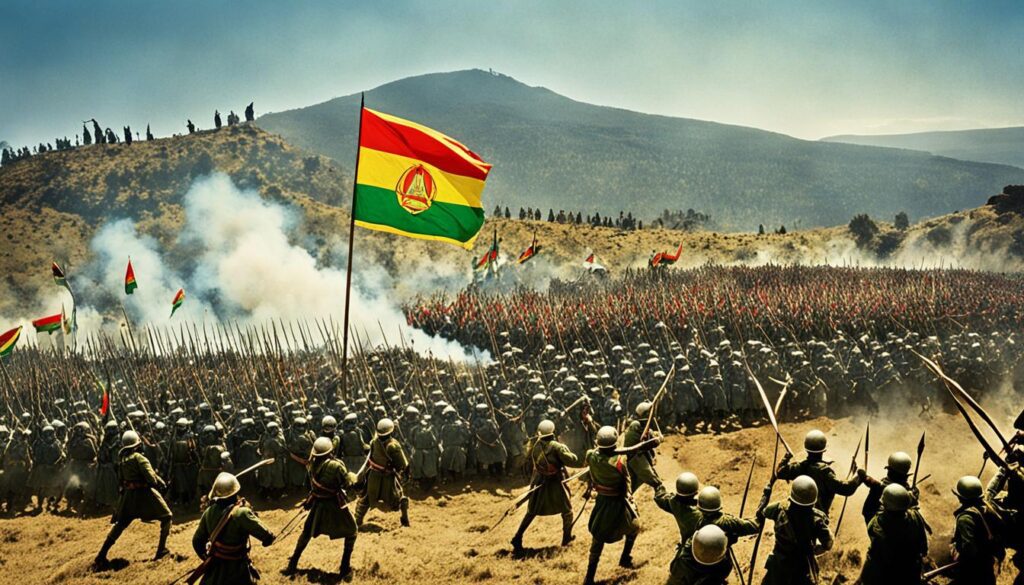How Did Ethiopia Gain Independence?
Did you know that Ethiopia’s fight for independence began with a remarkable victory over Italian troops, marking a turning point in the country’s history? On March 1, 1896, a well-armed Ethiopian force defeated the Italians in the Battle of Adwa, securing Ethiopia’s independence and inspiring anti-colonial movements across Africa. This significant event not only highlights the resilience and determination of the Ethiopian people but also sheds light on the broader struggle for African independence.
Key Takeaways:
- The Battle of Adwa, fought on March 1, 1896, was a pivotal moment in Ethiopia’s fight for independence.
- Ethiopia’s victory in the Battle of Adwa shattered the notion of African inferiority in the eyes of colonizers and inspired anti-colonialist movements across Africa.
- Emperor Menelik II played a crucial role in Ethiopia’s fight for sovereignty, mobilizing a diverse army and utilizing modern weaponry.
- The Battle of Adwa’s legacy can be seen in the recognition of Ethiopian independence by other European powers and the ongoing influence of Pan-Africanism.
- This historic event continues to be celebrated as a symbol of Ethiopian strength and African resistance against colonialism.
The Scramble for Africa and Italy’s Colonial Ambitions
In the late 19th century, European countries embarked on what is commonly known as the “Scramble for Africa.” This period witnessed a frenzy of European colonization throughout the continent, as nations vied for control and economic dominance. Italy, being one of these European powers, developed its own colonial ambitions in Africa.
By 1885, Italy had established a significant presence in the Horn of Africa. It occupied territories such as Eritrea and parts of Somalia as part of its colonial expansion. Italy’s aim was to secure resources, establish trade routes, and extend its influence in the region.
As Italy expanded its colonial empire, it inevitably clashed with Ethiopia, a country fiercely determined to maintain its independence. These conflicts culminated in the Italo-Ethiopian War, a turning point in the struggle for control over Ethiopia.
“Italy signed a treaty with Emperor Menelik II in 1889, but disputes over its terms eventually led to hostilities.”
The ambitions of Italy’s colonial enterprise clashed with Ethiopia’s determination to resist foreign domination. Despite an initial treaty between Italy and Emperor Menelik II, disagreements arose regarding the treaty’s terms, ultimately leading to hostilities.
These tensions set the stage for a significant confrontation between Italy and Ethiopia, further fueling the ongoing struggle for African independence amidst European colonization. The outcome of this clash would profoundly impact the course of history.
European Colonization of Africa
The Scramble for Africa represented a turning point in European colonialism and its impact on the African continent. European powers, driven by economic interests and a thirst for empire building, sought to exploit Africa’s abundant resources and establish control over its territories.
The competition for territory and resources resulted in the arbitrary division of Africa, often disregarding the cultural, ethnic, and historical realities of the indigenous populations. This division, driven by European ambitions, laid the groundwork for years of exploitation and oppression.
Italy’s colonial ambitions in Africa aligned with this broader European agenda. However, Ethiopia’s resistance exemplified the determination of African nations to preserve their independence and challenge the prevailing narrative of African inferiority.
“Italy’s colonial ambitions led to conflicts with Ethiopia, culminating in the Italo-Ethiopian War.”
The Italo-Ethiopian War exemplified the clash between Europe’s colonial ambitions and Africa’s fervent quest for self-determination. The battle lines were drawn, and Ethiopia stood as a symbol of resistance against Italian colonialism.
Italy’s Colonial Ambitions
The late 19th century witnessed Italy’s emergence as a colonizer in Africa. Eager to establish its own colonial empire, Italy set its sights on strategically significant territories in the Horn of Africa.
Italy’s colonial ambitions included the occupation of Eritrea and parts of Somalia, aimed at securing key ports and trade routes. This expansionist agenda laid the groundwork for conflicts with Ethiopia, a country that fiercely defended its independence and sovereignty.
While initial diplomatic efforts resulted in a treaty between Italy and Emperor Menelik II, disputes over its terms eventually led to hostilities. These disputes crystallized Italy’s determination to assert its authority and control over Ethiopia, setting the stage for a pivotal moment in African history.
Menelik II’s Leadership and Ethiopian Resistance
Emperor Menelik II played a crucial role in Ethiopia’s fight against colonization. Under his leadership, Ethiopia united its regional rulers and formed a formidable army to defend its sovereignty. Menelik’s strategic military maneuvers and utilization of modern weaponry were key factors in the Ethiopian resistance against Italian forces.
Accompanied by his wife, Taytu Betul, Menelik launched a successful public relations campaign to garner support for their cause. Their efforts rallied the Ethiopian people and garnered international recognition for their struggle against colonization.
Menelik’s military expertise and diplomatic initiatives were instrumental in the eventual victory of the Battle of Adwa. His leadership allowed the Ethiopians to push back against Italian aggression, securing Ethiopia’s independence and inspiring future liberation movements across Africa.
“The defense of our country against foreign aggression is not only our duty, but it is also a fight for our freedom and the preservation of our culture. We must stand united and resolute in the face of colonial domination.” – Emperor Menelik II
The Ethiopian Resistance Campaign
Under Emperor Menelik II’s guidance, Ethiopia implemented a comprehensive resistance campaign against Italian colonization. This campaign encompassed military strategies, diplomatic negotiations, and domestic mobilization efforts.
The Ethiopian army underwent extensive training and modernization under Menelik’s leadership. They adapted their tactics to match the advancements of the Italian forces, making strategic use of terrain and employing guerrilla warfare techniques.
Furthermore, Menelik’s diplomatic initiatives played a crucial role in rallying support from other nations and undermining colonialist influence. His successful negotiations and alliances secured the necessary resources to launch a robust resistance against the Italian occupation.
Menelik also focused on promoting a sense of national unity among the diverse ethnic groups within Ethiopia. By emphasizing the shared history, culture, and aspirations of the Ethiopian people, he fostered a spirit of collective resistance against colonization.
| Key Aspects of Menelik II’s Leadership | Role in Ethiopian Resistance |
|---|---|
| Military expertise | Implemented modern warfare tactics and training |
| Diplomatic efforts | Negotiated alliances and secured international support |
| Public relations campaign | Rallied domestic and international support against colonization |
| National unity | Fostered a collective spirit of resistance among diverse ethnic groups |
The Significance of the Battle of Adwa

The Battle of Adwa, fought on March 1, 1896, marked a monumental moment in Ethiopia’s struggle for independence and the liberation of Africa as a whole. Led by Emperor Menelik II, the Ethiopian army achieved a resounding victory over the Italian troops, securing Ethiopia’s sovereignty and sparking a wave of inspiration across the continent.
This historic triumph shattered the prevailing notion of African inferiority propagated by colonizers, asserting the strength and resilience of the Ethiopian people. It transformed the narrative surrounding African nations and served as a powerful symbol of resistance against colonization, igniting hope and fueling the determination of other African liberation movements.
“The Battle of Adwa demonstrated to the world that Africans were capable of defending their sovereignty and challenging the forces of colonization. It was a turning point that shifted the dynamics of power and paved the way for the recognition of Ethiopia’s independence.”
The significance of the Battle of Adwa extends beyond its immediate impact. It played a pivotal role in the development of Pan-Africanism, inspiring unity and cooperation among African nations in their collective quest for freedom and self-determination. This watershed moment in history continues to resonate as a testament to the indomitable spirit of the Ethiopian people and their unwavering commitment to the liberation struggle.
The Legacy of the Battle of Adwa
The Battle of Adwa’s legacy reverberates through the annals of African history. It not only secured Ethiopia’s independence but also compelled other European powers to recognize and respect the sovereignty of African nations. Italy’s defeat in Adwa prompted a strategic retreat, marking a pivotal shift in the power dynamics of the region.
This momentous victory challenged the prevailing colonialist narratives of African inferiority, forcing the world to acknowledge the strength, resilience, and cultural richness of African societies. It showcased the potential of unity and collective action while serving as a rallying cry for other African nations engaged in their respective struggles for liberation.
The Battle of Adwa’s profound impact can be felt in various facets of society, including art, literature, and popular culture. It has inspired numerous works that pay homage to Ethiopia’s defiance and resilience, serving as a constant reminder of the power of the human spirit in the face of adversity.
Post-Battle Developments and Legacy

Following the Battle of Adwa, Italy’s forces retreated from Ethiopia, and the country regained its independence. This victory had far-reaching consequences. Italy recognized Ethiopian independence, as did other European powers. The battle also challenged European perceptions of Africans and forced them to take African nations more seriously. Ethiopia’s resistance against Italy’s subsequent occupation under Mussolini’s regime further solidified its status as a symbol of African resistance to colonization. The legacy of the Battle of Adwa can be seen in popular culture, such as the portrayal of the fictional nation of Wakanda in the Black Panther movies as a symbol of uncolonized Africa.
Recognition of Ethiopian Independence
Italy’s defeat at the Battle of Adwa marked a turning point in their colonial ambitions in Ethiopia. The retreat of Italy’s forces following their defeat paved the way for the recognition of Ethiopian independence, not just by Italy but by other European powers as well. This acknowledgment of Ethiopia’s sovereignty was a significant milestone in the fight against colonization and a testament to the resilience and determination of the Ethiopian people.
Challenging European Perceptions
The Battle of Adwa shattered the prevalent European perceptions of Africans as inferior and weak. The defeat of Italian forces by Emperor Menelik II’s well-armed Ethiopian army showcased the strength and resilience of African nations. This victory forced European powers to reevaluate their assumptions and take African nations more seriously, contributing to a shift in the dynamics of colonialism.
Pan-Africanism and African Resistance
Ethiopia’s successful defense against Italian colonization became a powerful symbol of African resistance to colonialism. The Battle of Adwa inspired other African nations in their own struggles for independence and fueled the pan-Africanist movement. The ideology of pan-Africanism, which advocates for the unity and empowerment of African people, was further fueled by the legacy of Adwa, contributing to the broader fight against colonialism across the African continent.
Conclusion
The Battle of Adwa stands as a defining moment in Ethiopian history and the broader struggle for African independence. We witness the remarkable resilience and determination of the Ethiopian people in safeguarding their sovereignty. Not only did this historic victory secure Ethiopia’s independence, but it also ignited a flame of inspiration that spread throughout the continent. Fellow African nations found courage and motivation in the triumph at Adwa, emboldening their own resistance against colonial powers.
The Battle of Adwa shattered the colonialist assumptions of African inferiority, breaking down the barriers of prejudice and discrimination. It serves as a testament to the indomitable spirit and capabilities of African nations, dispelling the myth of African weakness. The significance of this battle within the broader scope of African history cannot be overstated.
With its resounding impact, the Battle of Adwa played a pivotal role in the development of Pan-Africanism—a movement that sought to unite African nations under the common goal of liberation and independence. This monumental victory served as a rallying cry for generations to come, creating a sense of collective identity and fostering unity among African nations.
The legacy of the Battle of Adwa endures to this day, carrying an enduring message of unity and the fight for freedom. It serves as a reminder that when a nation stands united in the face of adversity, remarkable achievements are possible. Ethiopia’s triumph at Adwa continues to inspire and empower not only the Ethiopian people but also those who aspire to overcome oppression and secure their independence.




